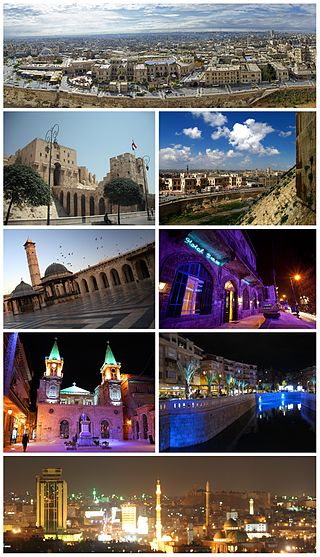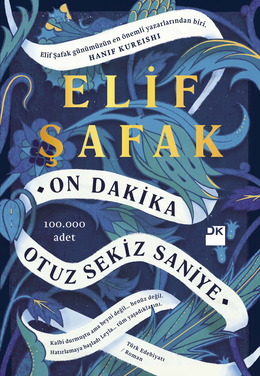
Aleppo is a city in Syria, which serves as the capital of the Aleppo Governorate, the most populous governorate of Syria. With an estimated population of 2,098,000 residents as of 2021, it was Syria's largest city until its population was surpassed by Damascus, the capital of Syria, the largest in Syria's northern governorates and also one of the largest cities in the Levant region.

Elif Shafak is a Turkish-British novelist, essayist, public speaker, political scientist and activist.
Philip Robert Rhys Mansel is a British historian of courts and cities, and the author of a number of books about the history of France and the Ottoman Empire. He was born in London in 1951 and educated at Eton College, Balliol College, Oxford, and obtained a doctorate at University College London in 1978. He has lived in Paris, Istanbul and Beirut and now lives in London.
Justin Marozzi is an English journalist, historian and travel writer.

The Battle of Aleppo was a major military confrontation in Aleppo, the largest city in Syria, between the Syrian opposition against the Syrian government, supported by Hezbollah, Shia militias and Russia, and against the Kurdish-majority People's Protection Units (YPG). The battle began on 19 July 2012 and was part of the ongoing Syrian Civil War. A stalemate that had been in place for four years finally ended in July 2016, when Syrian government troops closed the rebels' last supply line into Aleppo with the support of Russian airstrikes. In response, rebel forces launched unsuccessful counteroffensives in September and October that failed to break the siege; in November, government forces embarked on a decisive campaign that resulted in the recapture of all of Aleppo by December 2016. The Syrian government victory was widely seen as a turning point in Syria's civil war.

Al-Hatab Square is one of the oldest squares in the Syrian city of Aleppo. It is located in the old Jdeydeh Quarter, outside the historic walls of the Ancient City of Aleppo. The square suffered catastrophic damage during the Syrian civil war.

Beit Junblatt is a historic mansion that resides in Aleppo, Syria, built in the 16th century by a Kurdish emir of the Janbulad family.

Al-Jdayde is a historic predominantly Christian neighbourhood of Aleppo. It is noted for its winding narrow alleys, richly decorated mansions and churches. It was an area of significant cultural and historical interest. Much of Al-Jdayde suffered catastrophic damage during the Syrian Civil War.

Beit Ghazaleh is one of the largest and better-preserved palaces from the Ottoman period in Aleppo. It was named after the Ghazaleh family that owned it for about two centuries. Since 1914, it was used as a public school and restored to host the Memory Museum of the city of Aleppo. Beit Ghazaleh is located in the Al-Jdayde district of Aleppo. The structure has been damaged by warfare and earthquakes.

The Bastard of Istanbul is a 2006 novel by Elif Shafak, written originally in English and published by Viking Adult. It was translated by Aslı Biçen into her native language Turkish under the title Baba ve Piç in March 2006, and became a bestseller.

The Club d'Alep is a social club of Aleppo which was founded in 1945 and located in a former residential mansion in the city's Azizieh district. The club has been celebrated internationally for the quality and authenticity of its Aleppine cuisine.

The Forty Rules of Love is a novel written by the Turkish author Elif Shafak, Her interest in writing this book was influenced by the degree she received in Gender and Women’s Studies. The book was published in March 2009. It is about Maulana Jalal-Ud-Din, known as Rumi and his companion Shams Tabrizi. This book explains how Shams transformed a scholar into a Sufi (mystic) through love. More than 750,000 copies of this book were sold in Turkey and France.

Three Daughters of Eve is a 2016 novel by Turkish writer Elif Safak. In many places, the book was recalled and retitled Confused Quest. The book centres on a wealthy, middle-aged housewife, her childhood in Istanbul and her time as a student at Oxford University where she fell in love with a philosophy professor. It focuses on her categorizing her identity. The book was featured on several lists of "best books" in 2018.

10 Minutes 38 Seconds in This Strange World is a 2019 novel by Turkish writer Elif Shafak and her eleventh overall. It is a one-woman story about a sex worker in Istanbul. It was released by Viking Press in 2019.
Constantinople: City of the World's Desire 1453-1924 is a 1995 non-fiction book by Philip Mansel, covering Constantinople during the rule of the Ottoman Empire.

Levant: Splendour and Catastrophe on the Mediterranean is a non-fiction book by Philip Mansel.
Dressed to Rule: Royal and Court Costume from Louis XIV to Elizabeth II is a 2005 non-fiction book by Philip Mansel, published by Yale University Press.
Prince of Europe: the Life of Charles-Joseph de Ligne, 1735–1814 is a 2003 non-fiction book by Philip Mansel, concerning Charles-Joseph, 7th Prince of Ligne.
The sack of Aleppo was a major event in 1400 during the war between the Timurid Empire and Mamluk Sultanate.
The Rise and Fall of is an English snowclone popularly used in titles of works. Examples of its usage include:













